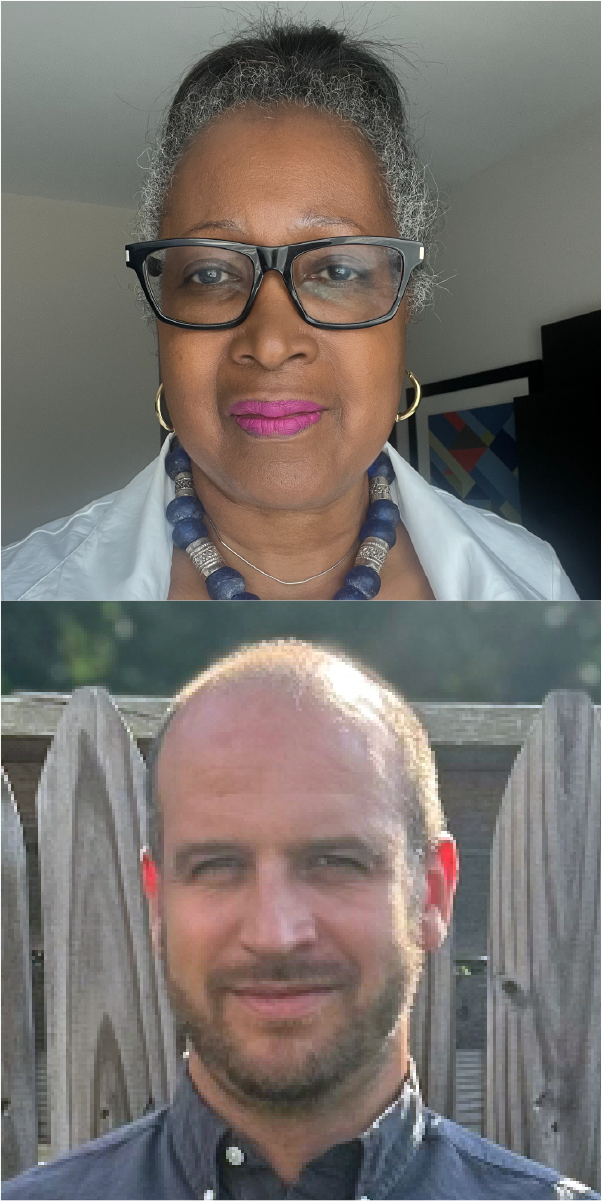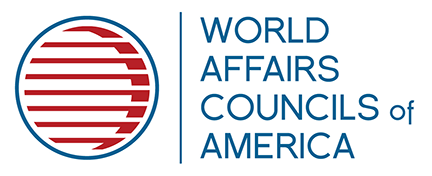
Haiti: Crisis in Context
Monique Clesca (remote)
Writer, journalist, advocate, member of the Commission for the Search for a Haitian Solution to the Crisis, former Advocacy & Communication Officer for UNICEF in Haiti
Jake Johnston
Director of International Research at the Center for Economic and Policy Research
Author of Aid State: Elite Panic, Disaster Capitalism, and the Battle to Control Haiti
February 20, 2025
Dennos Museum Center Milliken Auditorium, Traverse City, MI
In person & online
Thursday, February 20, 2025
6:30 pm Eastern US program | 5:30 pm reception
Dennos Museum Center Milliken Auditorium
1701 E. Front St. Traverse City, MI
Hybrid event |
in-person audience and online livestream
In-person admission |
$15 per person
Online admission |
$10 per person | watch online
Students & educators | free admission for current students and educators, including NMC and area secondary schools.
Members |
Supporters of IAF do not need to purchase tickets. Members make these programs possible via membership gifts. Thank you.
Suggested Resources
Haiti's Rule of Lawlessness | by Monique Clesca for The Dialogue - Leadership for The Americas, March 14, 2023
Synopsis of Aid State: Elite Panic, Disaster Capitalism, and the Battle to Control Haiti by Jake Johnston (Macmillan 2024) | Center for Economic & Policy Research
What does the international community owe to Haiti? 1A WAMU NPR February 3, 2024
Haiti Timeline provided by Johnston & Clesca
1791: Beginning of Haitian revolution, led by Toussaint Louverture; at the time, the French-controlled colony of Saint-Dominique was known as the “Pearl of the Antilles.”
1804: Jean-Jacques Dessalines proclaims Haitian independence; nation becomes the first country in the world to abolish slavery.
1825: Under military threat from France and cut off from trade with most of the world’s powers, Haiti’s post-independence rulers agreed to pay France the modern equivalent of $560 million as compensation for the former colonial power’s lost property, i.e. the formerly enslaved population in exchange for formal recognition from France. The total loss to Haiti has been estimated to be greater than $20 billion.
1862: US formally recognizes Haiti.
1914: US Marines land in Haiti and seize the country’s gold reserves, transporting them back to New York to be held in the vaults of City Bank.
1915: US Marines again land in Haiti, this time to stay. The US created the Haitian gendarmerie, a precursor to the Haitian military that operated under the control of the US Marines. There were several resistance movements (for example, the Cacos) organized by Haitians against the US occupation, which were brutally repressed.
1917: With US officials largely in control of the country, a new constitution is forced through that allows foreigners to directly own property.
1934: US occupation of Haiti formally ends.
1947: US control over Haiti’s finances comes to an end. Beginning in the late 19th century, Haiti increasingly turned to US banks to ensure it continued to pay its independence debt to France. The US controlled Haiti’s finances to ensure repayment of those debts.
1957: Francois “Papa Doc” Duvalier is elected president, beginning a 29 year brutal father-son dictatorship that caused thousands of deaths, disappearances and and undertook little in the way of social investments. Several resistance movements were violently suppressed.
1971: Francois Duvalier dies and power is transferred to his son, 19-year old Jean Claude “Baby Doc” Duvalier.
1986: National protests force Baby Doc from power.
1990: Haiti’s first free and fair election is held. Liberation theologian priest Jean Bertrand Aristide wins in a landslide.
1991: Just 8 months into his first term, Aristide is overthrown in a military coup. Some backers of the coup were later revealed to be on the CIA’s payroll. Nevertheless, the US imposes an embargo on the country as part of the effort to oust the military junta.
1994: US troops invade Haiti to restore the ousted Aristide to power.
2000: Rene Preval, who had been Aristide’s prime minister in 1991, becomes the first president in Haiti’s history to be democratically elected and then hand power to a democratically elected successor. Aristide wins the election in a landslide with many opposition parties boycotting the vote.
2004: Aristide is overthrown again after massive protests against his increasingly undemocratic maneuvers. US troops deploy once again to Haiti, giving way to a United Nations peacekeeping force months later. A transitional government takes power.
2006: Rene Preval elected president for a second time with turnout greater than 50 percent.
2010: Magnitude 7.0 earthquake strikes Haiti, resulting in upwards of hundreds of thousands of deaths and a million displaced. Countries from across the world pledge $10 billion to help “build back better.”
2011: US, UN, and Organization of AMerican States (OAS) intervene to overturn the results of Haiti’s first post-quake election, precipitating the rise of President Michel Martelly. Only about 20 percent of voters participated in the election.
2016: Martelly leaves power without having held elections to vote on a new president and after having established or financed armed gangs. A transitional government assumes power once again. Hurricane Matthew strikes the country’s southern peninsula, leading to widespread damage and loss of life. Elections are held just weeks later, with less than 20 percent voter participation. Jovenel Moise, Martelly’s chosen successor, wins.
2017: The 13-year long UN peacekeeping mission known by its French acronym, MINUSTAH, withdraws from the country. At its peak, the mission contained more than 10,000 foreign soldiers. A new, smaller mission composed of police and ostensibly focused on justice takes its place.
2018: A youth rebellion against lack of services and job opportunities is followed by massive protests against corruption and impunity and Moise's constitutional reform referendum leading to a major social, economic and political crisis.
2021: Haitian president Jovenel Moise is assassinated in his home. Civil society and political parties lead efforts to find a solution to the crisis. Armed gangs supported by political and economic interests proliferate and start their takeover of massive areas in Port-au-Prince.
2022: De facto prime minister Ariel Henry, who took power following the assassination with US support, calls for foreign military intervention to secure the country from armed gangs.
2024: Henry is forced from power as a coalition of armed groups in the capital seize greater control over Port-au-Prince. A new transitional government takes power with the involvement of the US and CARICOM. Kenyan troops begin deployment to Port-au-Prince as part of a US-financed multinational security support mission.
About the Speakers
Monique Clesca Monique Clesca is currently an international consultant after a career of more than 25 years specializing in high-level policy dialogue, human rights, youth and women programming, development, and crisis communication and writing. A feminist pro-democracy, pro-social justice activist, she is also a member of the civil society Commission to find a Haitian solution to the crisis and of Haiti Think Tank and a member of the Montana Agreement Monitoring Bureau. She is a Board member of EQUIPOP, an international NGO that promotes health and human rights for youth and women in the world, particularly in Africa.
Ms Clesca was appointed Representative of the United Nations Population Fund in Niger in 2012, after serving as its Regional Adviser for Africa in New York and Regional Advocacy and Communication Adviser for 22 Southern African countries. In Niger, she initiated and spearheaded a country-wide movement for the elimination of child marriage, a traditional practice entrenched in centuries-old ideas of protecting women, and “Illimin,” an adolescent girl empowerment initiative now adopted as a model for West African countries. She led her team to winning a WEBBY award for the series on Niger girls empowered against child marriage as well as to record resource mobilization for the implementation of the cooperation program. The President of Niger awarded her the country’s highest honor in the Niger Order of Merit, that of Commander in 2016. She has been a trusted adviser of Traditional Chiefs in Niger and Heath and Population Ministers in various African countries, and leveraged well-known artists and top influencers for girls’ and women’s rights.
Ms. Clesca was a founding member of MC Conseils, a communication and special event firm that provided services to government, civil society and international organizations in Haiti between 1996 and 2003. Previously, she served as Advocacy and Communication Officer for UNICEF Haiti from 1983 to 1996 and spearheaded the campaign on the Convention on the Rights of Children and a national network of media and journalists in favor of children.
She has been a speaker at the Yale Law School Human Rights Clinic, the Canada Parliement and a guest on Democracy Now, CNN, MSNBC, NBC News, NPR, Black News.
Ms. Clesca’s writing has appeared in major national and international newspapers and magazines, including Foreign Affairs, Americas Quarterly, The New York Times, the Miami Herald, Huffington Post, Le Nouvelliste, Ayibopost. She has authored two books: a novel La Confession and a compilation of essays entitled Mosaiques and is currently writing her memoir Celebrating My Mysteries of her childhood under the Duvalier dictatorship. She was profiled by the French newspaper, L’Humanité, in 2015 and Le Nouvelliste in 2015 and 2016. She received a Bachelor’s Degree in Philosophy from Howard University and a Master’s Degree in Journalism from the Medill School of Journalism of Northwestern University.
Learn more about Monique Clesca here.
Jake Johnston is the Director of International Research at the Center for Economic and Policy Research in Washington, DC.
He has a B.A. in Economics from Boston University and an M.A. in Writing from Johns Hopkins University. At CEPR his research has focused predominantly on economic policy in Latin America, the International Monetary Fund and US foreign policy. He is the lead author for CEPR’s Haiti: Relief and Reconstruction Watch blog and his articles and op-eds have been published in outlets such as The New York Times, The Nation, The Intercept, Le Monde Diplomatique, Boston Review, and Al Jazeera. His book, Aid State: Elite Panic, Disaster Capitalism, and the Battle to Control Haiti, is now available from St. Martin’s Press.
Learn more about Jake Johnston
here.
About the Moderator
Major General Mike Lehnert served in the Marine Corps for 37 years. During that time he held thirteen separate commands. In 1995 he deployed to Guantanamo Bay, Cuba during Operation Sea Signal where he led the Joint Task Group responsible for the operation of the camps housing over 50,000 Cuban and Haitian migrants. He was the Chief of Staff of the U.S Southern Command in 2004 during the Haitian Coup d'etat. His last tour before leaving the Marine Corps was command of seven Marine Corps bases West of the Mississippi. Lehnert serves as co-chair on the International Affairs Forum Advisory Board.



















